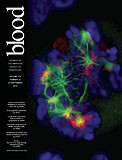Hirabayashi S, Flotho C, Moetter J, Heuser M, Hasle H, Gruhn B, Klingebiel T, Thol F, Schlegelberger B, Baumann I, Strahm B, Stary J, Locatelli F, Zecca M, Bergstraesser E, Dworzak M, van den Heuvel-Eibrink MM, De Moerloose B, Ogawa S, Niemeyer CM, Wlodarski MW. European Working Group of MDS in Childhood. Blood. 2012 Mar 15;119(11):e96–9. Epub 2012 Jan 11. IF: 10.558

Department of Paediatric Haematology and Oncology
Abstract
Somatic mutations of the spliceosomal machinery occur frequently in adult patients with myelodysplastic syndrome (MDS). We resequenced SF3B1, U2AF35, and SRSF2 in 371 children with MDS or juvenile myelomonocytic leukemia. We found missense mutations in 2 juvenile myelomonocytic leukemia cases and in 1 child with systemic mastocytosis with MDS. In 1 juvenile myelomonocytic leukemia patient, the SRSF2 mutation that initially coexisted with an oncogenic NRAS mutation was absent at relapse, whereas the NRAS mutation persisted and a second, concomitant NRAS mutation later emerged. The patient with systemic mastocytosis and MDS carried both mutated U2AF35 and KIT in a single clone as confirmed by clonal sequencing. In the adult MDS patients sequenced for control purposes, we detected previously reported mutations in 7/30 and a novel SRSF2 deletion (c.284_307del) in 3 of 30 patients. These findings implicate that spliceosome mutations are rare in pediatric MDS and juvenile myelomonocytic leukemia and are unlikely to operate as driver mutations.
-mk-